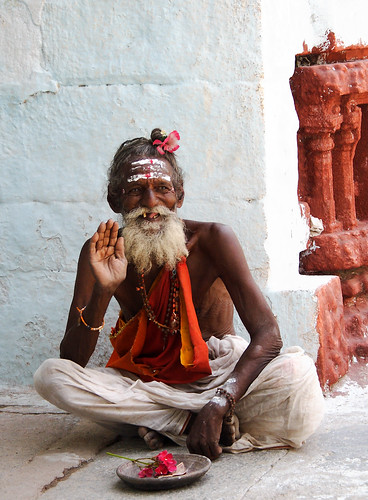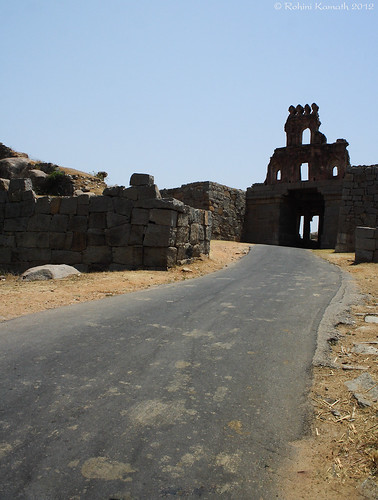
Yes, its been an age; I know. We just got back from a week long touristy holiday in Hong Kong. Photos and trip report will follow ( at least I hope so, with the back log of pending processing already looming over me.)
Getting back to Hampi, the end of Day 2 coincided with India winning the world cup cricket match. We watched it from our hotel room (Ok, so it was K who watched. I slept through India's batting I'm afraid.) Either way, the next morning, also our final Day in Hampi, we didn't wake at dawn.
Before we get into the days activities, we need a little history with a dash of mythology. The Tunga river separates the ruins of Hampi from those on Anegondi.
First some history, Anegondi was the old capital of the Vijaynagar Empire, with its naturally rocky geography lending it self well to fortification, before expansion required a shift to the new capital on the other side of the river bank at Hampi. The name is said to have come because the the king's army elephants were stationed there (Ane means Elephant in Kannada, Gondi means deep pit ).
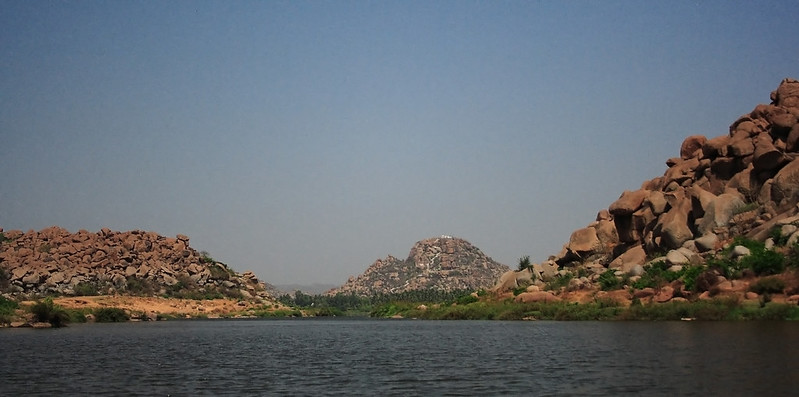
Anegondi was the capital city when Mohammad Tughlaq, the then Sultan of Delhi, defeated the king Jambukeshwara Raya and installed his representative in the kings place. It is said the brothers Hari Hara and Bukka Raya founders of the Vijayanagar empire managed to successfully recapture Anegondi without armed conquest by sneaking into the Anegondi fort (of which only ruins now remain) and taking the sultan's representative prisoner while he was drunk. [ Imp lesson here folks - don't drink and rule ]
Now some mythology, Anegondi is also said to be the mythical kingdom of Kishkinda from Ramayana. Its important to know this because a majority of the historical ruins are all drawn from the epic. The monkey god Hanuman was said to have been born here. He met Ram and Lakshman for the first time here. The great mano-a-mano battle (or is it monkey to monkey ?) between Vali and Sugriva is also said to have occurred here. This is also where Ram met Shabri and ate the famous fruit, also where Jatayu the vulture was killed. So brush up on your epic before you get here.
To see the ruins on the other side of the river Tungabhadra and that meant a crossing. There are 3 crossing points - at the Virupaksha Temple, the Kondendarama Temple and the one at the Vittala Temple. We chose the latter. This is also the place where you can see the collapsed cable stayed bridge which was the governments brain child, intending to link Hampi to Anegondi.
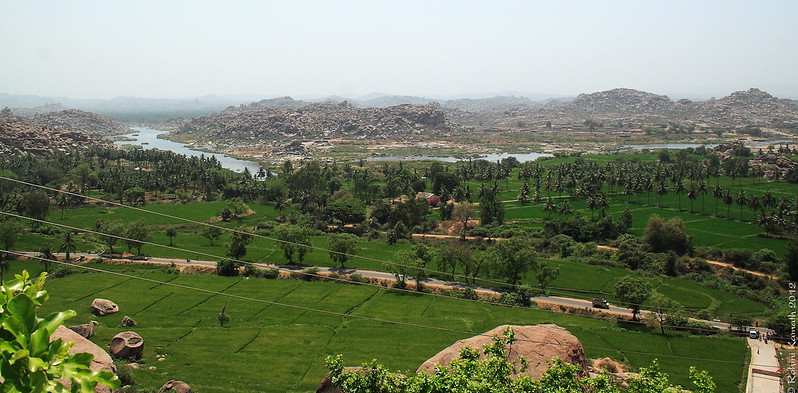
Ofcourse the good King Kampabupa, brother of the king Harihara II had also had the same idea, way back in the day and had met with greater success. The ruins of that bridge of which only the supporting pillars now remain look better than the more recent govt funded ruin which frankly is an eye sore.
In the absence of bridges, the crossing is by coracle or by small motorized wooden boats. Sadly we couldn't get the coracle and you should take it if you can, what better way to relive the glory of Vijayanagar than by using the same transport as they did. The motorized boats, somehow defy the laws of physics and also transport 2 wheelers in an already cramped boat and get them across.
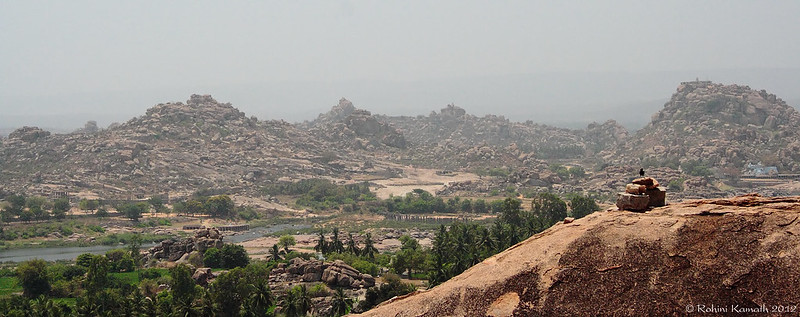
The great BushChat (male) surveys his kingdom
We left the car and proceeded on foot. The heat though persuaded us to reconsider our decision, and alighting on the other side after a short 5 min boat ride, we decided to hire an auto for the day. The driver insisted on taking us to all the tourist places and drop us back as well.
It offers great panoramic views of the whole of Hampi and in hind sight, I think it should be done on ones first day and probably either first thing in the morning or just before sun set.
Its quite a climb and because we did it at noon the April sun was already high up in the sky and beaming cruelly upon us. There is no shade to cower into. The steps are slightly uneven and steep and at the 3/4th mark I gave up, the whole of vijaynagar was spinning slowly around me. A Caucasian couple coming down warned us that people up top were hopping like bunnies on the hot stones. Important lesson 2 : always wear thick dark coloured socks when visiting Hindu temples.
At the top is Anjenyadri a small temple dedicated to the Vanar God Hanuman (Anjaneya - means Son of Anjana ) who lends his name to this hill. He was the son of Anjana and Vayu ( also called Maruti - son of Marut another name of Vayu). It is believed that this is his birth place.
Sorry I couldn't make it to the top, I will next time. Dehydration is a major problem here, there are no toilets to be seen anywhere, so you really don't want to drink too much water, but do keep yourself hydrated in the summer. Carry your water and some snacks with you, I didn't find any one selling any at the bottom.


 Spotted Owlet at Hazara Rama Temple
Spotted Owlet at Hazara Rama Temple The true enthusiast would like to read up more and frankly though there is a lot of material, it is rather scattered and sources are questionable.
As K and I sat there in the sunset with the owl, I did wonder about the citizens of Vijayanagar, what were they like? What did they wear and what did they do for fun? And as my tummy rumbled, I wondered, what did they eat? Fortunately, if you also had these questions I have saved you time and found you the answers and the source does seem authoritative, the first in the form of a paper by Jyotsna Burde and the rest by Jyotsna K Kamat. Enjoy!
Food in Vijayanagar Times
Social Life
Pastimes and Sport
Clothing
Keshav's Photos can be seen here. Sources and Further Reading:
Other places to see in Anegondi - http://www.thekishkindatrust.org/?page_id=729
http://www.hindupedia.com/en/Sacred_Places_connected_with_the_Ramayana
http://www.brownbeat.net/india/hampi/120-hampi-a-the-ramayana?start=1
http://hampi.in/anegondi
Hampi and the Ramayana - In pictures
History through Vijaynagara Coins
Story of Vijayanagar Empire

